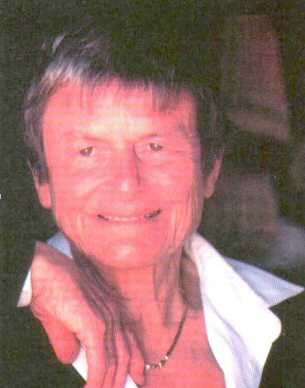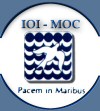“As T.S. Eliot put it: “The feminist-socialist ideals of my great-grandmother’s time; the socialist humanisms or humanist socialism of my father’s and my husband’s time are still with us. The democratic ideals, the ideal of universal peace are still with us, time present and time past, in time future. But time present, My Time, has transformed them, as future generations will transform what we have tried to build.” |
 |
Elisabeth Mann Borgese 1918 - 2002 |
Born in Munich just before the end of the First World War, Elisabeth Mann Borgese had an unusual ubbirnging, living in Germany between the wars, growing up with a Nobel-Prize winning father, going into exile as a teenager, and moving in stimulating circles peopled by creative individuals with strong literary, musical, and political interest. Not surprisingly ,this nourishing background produced a remarkable woman who led a remarkable life.
In 1939, she married G.A. Borgese in Princeton, New Jersey, and moved to Chicago, where he served at the University of Chicago as a professor of Italian literature. The Chicago years laid the foundation for her later work on international law and the oceans. Of particular significance was her involvement form 1945 ti 1952 with the Chicago Committee to Frame a world Constitution, which was a multidisciplinary university group that drafted a world constitution and commented on other universal constitutions produced by non-governmental organizations and private citizens at that time.
The issues and ideas with which the Chicago Committee grappled retained their relevance and remained in Elisabeth’s thinking and writing over the years. As she pointed out “We had to deal with the issue of sovereignty in an inter-dependent world; with governance, from the local to the national to the regional to the global level; with “virtual” regions, based on communality of cultures: with new, emerging forms of democracy and the role of civil society – all issues alive and kicking today!’ significantly, in light of the direction her work was to take, on e of the provisions of the Chicago world constitutions was to declare earth, water, air and energy “the common property of the human race” – the management and use of which was to be “subordinated in each and all cases to the interest of the common good.”
With McCarthyism on the rise in the United States, Elisabeth and her husband moved to his homeland, Italy, in 1952. Suddenly widowed three months after their arrival, she remained in Florence editing and writing, while bringing up two daughters. In 1964, her links with the United States were renewed when she accepted an invitation from Robert Hutchins, the dynamic founder and president of the Centre for the Study of Democratic Institutions in Santa Barbara, California, to become a fellow of the center. Once there, she continued the work that she had begun in Chicago, with a focus on human rights and disarmament. The year 1967, however, was a landmark and turning point in the history of her career. It was in that year the Ambassador Arvid Pardo of Malta made his famous proposal that the oceans be considered the common heritage of mankind. This proposal struck a chord that resonated throughout Elisabeth’s life and work. She abandoned her project on the world constitution and began to concentrate on a new approach to development co-operation that was conceived not as alms-giving but as sharing of what rightfully belongs to all.
The timing of Pardo's speech could not have been better Earlier that year Elisabeth had come to envisage ocean development and law of the sea "as the great laboratory for the making of a new world order". As she pointed out to Robert Hutchins, "our work on world government is very valid and very beautiful and very intelligent but 4 is as remote from reality today as it was twenty years ago; what we can do instead is to try out our new concepts, our new ideas, in the now maturing field of law of the sea.
Under the aegis of the Center for the Study of Democratic Institutions, Elisabeth took the lead in initiating a three-year project, culminating in 1970 with a major conference entitled Pacem in Maribus (Peace in the Oceans) - a reference to the then recent Pacem in Terris convocations, which had in turn taken as their starting-point Pope John XXIII's famous encyclical of the same name. These conferences, which examined issues relating to the peaceful use of the sea, have continued for three decades. Located symbolically in Pardo's home country of Malta, the first Pacem in Maribus conference provided the stimulus for Elisabeth to establish the International Ocean Institute (IOI) two years later, with financial help from the Maltese government and the United Nations Development Programme, and support and assistance from Arvid Pardo.
Initially conceived as a vehicle by which dialogue on ocean law and development could continue beyond that first Pacem in Maribus conference, the IOI grew from its modest beginnings in 1972 to a network of twenty centres around the world. At first it served mainly as a conference secretariat and think-tank, which was actively involved in the third United Nations Conference on the Law of the Sea (UNCLOS Ill), in which Elisabeth herself was heavily involved, initially as a representative of the IOI and later as a member of the Austrian delegation.
Soon after 1972, the IOI began to extend its activities into the neglected area of training. It had become apparent that the emerging law of the sea was placing demands developing countries that they could not meet without professional training for their personnel in the area of marine management. Elisabeth recognized, in particular, that the qualifications required for position at the International Seabed Authority and indeed throughout the international system, were such the developing countries would inevitable be under-represented. The lOI therefore developed training programmes in order to help change this situation, and in 1979, it held a first course on seabed mining. The course was followed by another training programme on management of the exclusive economic zone.
Since those early days, IOI operational centres around the world have conducted over 100 course offered primarily for professionals with responsibility for marine management in developing countries. An important feature these courses is their interdisciplinarity. Surprisingly, this was a somewhat new concept in the early 1970’s, and the 101 was in the vanguard successfully applying it in their pioneer training programmes.
In 1979 Elisabeth moved to Canada. She went to Dalhousie University in Halifax as a Senior Killam Fellow for one year but was soc made a full professor in the Department of Political Science. She became, in her own words, "the guest who stayed forever"
In addition to her research, teaching and lecturing, Elisabeth explored new ways of providing opportunities for training and education through the IOI. These new methods ranged from low-tech, grass-roots approaches, such as the work of the IOI in India with women in coastal villages, to a high-tech, almost futuristic proposal to establish the IOI Virtual University, through which an interdisciplinary, internationally recognized Master’s degree in ocean affairs would be offered. She was keenly interested in lifelong learning and aware of the great need to educate leaders, both potential and actual. For her, the IOI was the means of making this happen.
Even in her eighties, Elisabeth was actively involved in a wide range of projects relating to the oceans. She traveled the world to lecture, participate in conferences and workshops, attend meetings, chair international committees, raise the profile of ocean issues, and receive honours and awards from governments, organizations, and individuals. To the very end, her work schedule was grueling and her level of energy, passion, and commitment extraordinary for a person of any ages, let alone one who had already achieved so much.
In expressing regret at not being around in the future to see governance unfolding, she noted that at least “our generation can take some pride in having contributed, no matter how fumblingly and bunglingly, to the making of the new order for the seas and oceans, to the opening of new ways of thinking about world order, and to the hammering-out of a platform from which, in the future, a great many new initiatives can be launched.”
